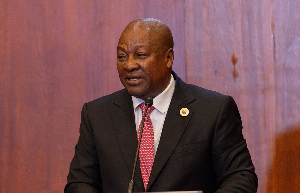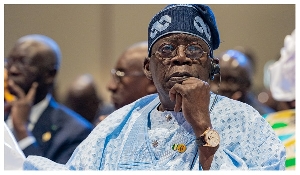Discrepancies in Values and Practice
My last article on the New Educational Reform prompted some people to ask me to write the next segment of this topic submitted in 2005.
In Part I it was noted that until Ghanaians/Africans begin to use their heads to make conscious judgments about the actions of the politicians and undertake an in-depth look at how our own actions impact on everyone, our practice of religion, in deed our faith and prayer would qualify to be defined (in the words of Ambrose Bierce) as ‘….a request to God that the laws of the universe to be annulled on behalf of Petitioners (Africans) who are confessedly unworthy of God’s Mercy ’.
This segment of the article seeks to further examine to how Ghanaians lost the values that sustained our communities in the past, and which are indispensable to our future as a nation of people who believe in the ultimate power of the God to deliver us from suffering. The three main religions central to the daily lives of Ghanaians are African Traditional Religion (which still accounts for up to about 40% of the Ghanaian population), Christianity and Islam. This writer contends that our contemporary values have all the fingerprints of the history and teachings of foreign religions- Islam and Christianity. Our values of community collective good have changed to values of individual good through association with these foreign religions.
The Role of Foreign Religions
Religion in contemporary Africa is truly the opium of the masses and has contributed to, arguably, eroding away our hither-to cherished values, including honesty, responsibility and compassion/solidarity. The historical, psychological and methodological developments of foreign religious practice partly explain how we lost our cherished values that kept our communities happy.Both Christianity and Islam teach that good deeds bring good rewards to the individual and in the judgment to come the individual will live in heaven/paradise with his/her family. This conception of the reward for religiosity is a departure from our traditional African religious teaching. African Traditional Religion has a communal focus. It teaches that the individual is connected to the community forever and his/her actions bring both individual and collective reward; in fact, the individual reward is tied to the community reward. Ghanaians as practitioners of African Traditional Religion were all part of the community; inseparable and worked for the good of the community. In this sense the individual had to strive to be good for the collective happiness of the community so as to be endorsed as one of the good ancestors on his/her death. The individual’s continuous connection to the community was unavoidable, even in death. This teaching ensured that every member aspired to the goal of having a good rather than bad /unpleasant connection with his/her ancestral community in death.
However, Islam and Christianity came to teach that the deeds of man earned him/her a place in paradise, where he/she has no connection to his original community. Thus, to do anything against one’s own community does not require answering to the entire community in death; for punishment in relation to sin is directed at the individual. These teachings did not/ do not have the exact communal component similar to African Traditional Religion. This is perhaps the genesis of the change in our values in relation to our communities. Islam and Christianity thus, brought far-reaching changes in our beliefs and values. Between the two faiths, Christian had a broader effect across Africa, not only on our beliefs and values, but our politics. It is critical to state that the changes (positive and negative) in our values of kindness, compassion, and hard-work, have got to do with collective effect of the historical development of Christian teachings, the psychological orientation induced by the context of colonial rule in which Christianity was taught, and the methodology of the teachings.
Historically, Christianity existed in Africa even before it got to Europe, and the Orthodox Christianity of North / North –East Africa was inherently different from the Christianity from Europe, which dominates today’s Africa,. The contemporary African brand of Christianity, which I choose to call Christianity of Colonisation was tainted with the ideology of domination, and separatism, and came with the bandwagon of the colonialists who set up the context in which it grew. As a consequence, it is not surprising for people to think that they are different from, better than and do would not want to associate with their family members who believe in Traditional African Religion- separation and exclusion.
The domination ideology of the colonialists introduced and nurtured values that lacked the humility and solidarity of the church. Consistently, the relationship with Africans was defined in master-servant terms, rather than in terms of two equal servants of God.
It is worth noting that the ideology of domination had just come of battering from the shackles of absolute Catholicism in Europe into the egalitarian era of Protestantism. Domination as an ideology was on its death-bed in Europe but found new lease of life in colonial Africa. Christian missionaries, in spite of their humility, dictated and inspired by the word of God, operated in the context of the new political atmosphere of colonialism; with a philosophy to dominate. This partly explains why the early European missionaries in Africa failed to condemn slavery in the first 300 years. It also provided basis for the missionaries’ broad and unfounded assumptions that African societies had few or no values worthy of emulation or recognition and had to be fed values issuing from the Christian principles.
Although the missionaries made honest attempts to teach all of the core Christian principles of honesty, humility, compassion and service to community among others, these teachings could not be divorced from the context and ideology of colonialism.
The methodology and teachings of the church became tied to the colonial administration’s agenda, and it is evident that the first Africans Christians were members of the church as well as agents of the colonial system. These African Christians were exposed to two competing streams of values- one stream of humility in service of God, and the other stream of prestige, power and domination and exclusiveness as part of the colonial establishment.
Between these two competing sets of values, the colonial value of domination was more attractive to the psychology of the African. Thus, the first African Christians were more of the products of the colonialists than they were of the true church. These colonialists-tainted values of exclusiveness, acquiring power to dominate have subsequently been passed on to our current generation of civil servants and politicians.
In a conscious process of selective exposure, most politicians are consistently choosing to imbibe the values cherished by the domination ideology of the colonialists, rather than those of service to God and the community in humility. In fact our politicians are so keen on domination and exclusion and learning to perfect their mechanisms for domination, exclusion and separatism.
Our religious leaders preach and support politicians who stand for exclusion, discrimination and separatism, which are the fuel of disharmony. They preach/pray ‘God give us this and that…………. and never ever …’ God help us and strengthen us to create, work and to provide this and that to our people who need our help’. They also preach/pray ‘God curse this and that group and not God help them to see the goodness of all humanity’. On the other hand most positive church values, which were in sync with our traditions were negatively acquired. For example the Christian value of helping others was negatively acquired, such that most Ghanaians prefer to receive than to give.
Today we have witnessed an evolution of these values at the individual and collective levels and they significantly affect our thoughts, tastes, desires, actions and preferred ways of doing things. We are left with distorted values and excessive concentration on prayer and individualism, even against the dictates of the scriptures and of course our traditional African religious philosophies. As individuals and as nations, we prefer to receive from others than to give. This is in spite of the teachings of the scriptures that ‘Blessed is the hand that giveth than the one that taketh’ (Holy Bible) or ‘The upper hand is better than the lower hand’ (Islamic teaching from Hadith). In fact, the desire to receive rather than give has grown to become (shamefully) an acceptable value, making us one of the most prominent beggar nations of Africa and much more. I will expand on this in Part III.















